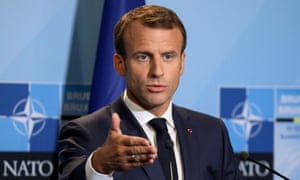The Future of the North Atlantic Treaty Organization
"What we are currently experiencing is the brain death of NATO. You have no coordination whatsoever of strategic decision-making between the United States and its NATO allies. None. You have an uncoordinated aggressive action by another NATO ally, Turkey, in an area where our interests are at stake."
"[NATO] only works if the guarantor of last resort functions as such. I’d argue that we should reassess the reality of what NATO is in the light of the commitment of the United States."
"Look at what is happening in the world. Things that were unthinkable five years ago – to be wearing ourselves out over Brexit, to have Europe finding it so difficult to move forward, to have an American ally turning its back on us so quickly on strategic issues – nobody would have believed this possible."
"[Europe was on] the edge of a precipice. If we don’t wake up … there’s a considerable risk that in the long run we will disappear geopolitically, or at least that we will no longer be in control of our destiny. I believe that very deeply."
French President Emmanuel Macron
 |
| Emmanuel Macron commenting beefore a NATO summit . Photograph: Reuters |
"I think President Macron's doubts ... can make other allies wonder if perhaps it is France that has concerns about sticking to it [NATO]."
"I hope that we can still count on France fulfilling its obligations."
Poland's Prime Minister Mateusz Morawiecki
France does have a way of placing itself front and centre as a leading member of NATO in Europe, alongside Germany. And both Emmanuel Macron and Angela Merkel present themselves as the strongest and most influential European members of the NATO alliance. It is as though each of them is prepared to be elevated to the brain centre of the alliance whose formulation was meant as a bulwark of Democratic nations headed by the United States, against the pervasive influence and dark shadow of the U.S.S.R. and creeping communism.
European NATO members have been given fairly good reason to be apprehensive about the future of NATO. Its guidance and leadership has always been the United States, the world's super power, its most influential and powerful nation which conceived of the alliance, its purpose and its membership to contain the threat of communism and the Soviet Union's universal ambitions. And when the impossible happened and the Berlin Wall fell, and the Soviets saw their satellites fall away one by one, NATO relaxed and its members took a break.
 |
| Emmanuel Macron inspecting French troops in August. He says Europe is suffering 'exceptional fragility' as a result of US unilateralism under Donald Trump, the rise of China, Turkey and Russia, and turmoil in the Middle East © AFP via Getty Images |
The world had suddenly become a safer place. Democracy had no more need to protect itself from a malign ideological force. Standing armies could begin to stand down, armaments allowed to rust out, the military-industrial complex to run out of ambition tuned out by nations downsizing their national armies and looking to a future of low threat levels. And then came the slow and steady military rise of a vastly resentful Russian Federation, its ambitions making for nervous neighbours.
China was not far behind Russia, the two nations forging an understanding of a common ideological heritage and national house-cleanings that sacrificed millions of people to their revolutionary zeal. All that behind them, they began their individual races for hegemonic power and influence, rebuilding neglected military bases and investing in new military technologies, throwing the heft of their ambition around their wary geographical neighbourhoods.
No one could have predicted, however, the rise of a real estate entrepreneur and entertainment magnate to the presidency of the United States, a man whose crude, spontaneous actions and pronouncements put everyone on edge and left the world reeling in a constant state of fearful expectation as Donald Trump took his mandate as the most powerful man on the globe as a presidential vanity project.
 |
 |
President Trump saw advantage to the United States in abdicating the throne of leadership in NATO. His sometimes-on, sometimes-off relationship with the alliance left its member-states in a state of suspense and nervous expectation.
The strategic partnership, once a stout alliance has become a flimsy screen portraying itself as action-oriented and as pledged toward mutual support as ever. The military and industrial power that the U.S. brought to the alliance all but abandoned.
The Parties to this Treaty reaffirm their faith in the purposes and principles of the Charter of the United Nations and their desire to live in peace with all peoples and all governments.
They are determined to safeguard the freedom, common heritage and civilisation of their peoples, founded on the principles of democracy, individual liberty and the rule of law. They seek to promote stability and well-being in the North Atlantic area.
They are resolved to unite their efforts for collective defence and for the preservation of peace and security. They therefore agree to this North Atlantic Treaty
NATO
Labels: China, Controversy, France, NATO, Russia, United States
0 Comments:
Post a Comment
<< Home